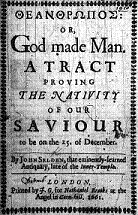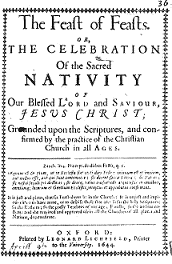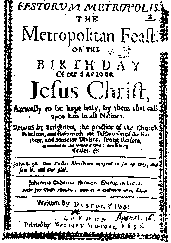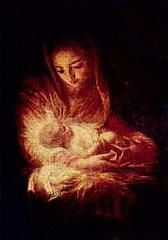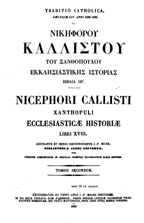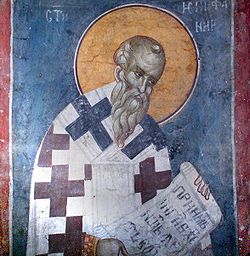FOR THE FEAST OF THE NATIVITY
Sermon 196
(1) Today, the birthday of our Lord Jesus Christ has dawned in
festive splendor for us. It is His birthday, the day on which
the Eternal Day was born. And hence it is this day because from
this day forward the length of the day increases. Our Lord had
two nativities: one divine, the other, human; both marvelous;
the one without a woman as mother, the other without a man as
father. Hence, the words of the Prophet Isaias may be applied to
both generations: 'Who shall declare his generation?[1]
Who would worthily tell of a God generating [His Son]? Who would
worthily relate the parturition of a virgin? The former
generation took place without the limits of time; the latter, on
a definite day in time. Both happened without human calculation,
and both are viewed with intense admiration. Consider that first
generation: 'In the beginning was the Word, and the Word was
with God; and the Word was God.'[2]
Whose Word? That of the Father Himself. What Word? The Son
Himself. Never did the Father exist without the Son, yet He who
was never without the Son generated that Son. He generated Him,
yet the Son had no beginning, for there is no beginning for Him
who was generated without beginning. Nevertheless, He is the Son
and He was generated. Someone is going to say: 'How was He
generated if He had ho beginning? If He was generated, He has a
beginning; if he has no beginning, then, how was He generated?'
I do not know how this happened. Do you ask me, a mere man, how
God was generated? I am troubled by your question, but I have
recourse to the words of the Prophet: 'Who shall declare his
generation?[3]
Come with me to [a consideration of] that human generation; come
with me to that in which He 'emptied himself, taking the nature
of a slave,[4]
come, to see if we can comprehend it, to see if we can speak
about it. For who would grasp the significance of: 'Who though
He was by nature God, did not consider being equal to God a
thing to be clung to 5 ? 4 Who would understand that? Who would
worthily ponder it? Whose mind would dare to investigate it?
Whose tongue would have the temerity to utter a decision
concerning it? Whose thought can encompass it? Meanwhile, let us
lay aside this problem as being too weighty for us. But, so that
it would not be too weighty for us, He 'emptied himself, taking
the nature of a slave and being made like unto men,' Where? In
the Virgin Mary. Then, let us say something if we have any power
of utterance. The angel announces; the Virgin hears, believes,
conceives, faith in her mind, Christ in her womb. A virgin has
conceived you are amazed; a virgin has brought forth a child you
are more amazed; after childbirth she has remained a virgin
therefore 'Who shall declare his generation?'
(2) I am going to say something that will please you, my very
dear brethren. There are three states of life pursued by the
members of the Church of Christ : marriage, widowhood, and
virginity. Because those states, those different manifestations
of purity, were destined to be found in the holy members of
Christ, all three states of life gave witness to Christ. In the
first place, the conjugal state bore this witness, for, when the
Virgin Mary conceived, Elizabeth, the wife of Zachary, having
already conceived, bore in her womb the herald of this Judge.
Holy Mary came to Elizabeth to greet her cousin. Thereupon, the
infant in Elizabeth's womb leaped for joy. He exulted; she
prophesied.[5]
Here you have conjugal purity bearing witness to Christ. Where
did the state of widowhood bear such witness? In the case of
Anna. When the Gospel was read recently, you heard that Anna was
a holy widow with prophetic powers who, having lived seven of
her eighty-four years with her husband, was constantly in the
Temple, worshiping in prayer both night and day. She, a widow,
recognized Christ, She saw a tiny babe; she recognized the great
God and she bore Him witness.[6]
You have, then, in her an illustration of the state of
widowhood. In Mary herself we have an illustration of the
virginal state. Let each one choose for himself which of these
three states he will. Whoever has elected to live outside these
states does not make provision for his inclusion in the members
of Christ. Let not those women who are married say: 'We do not
belong to Christ, for holy women have had husbands. Let not
those women who are virgins boast; let them, rather, humble
themselves in all things in proportion to their greatness.[7]
You have all the instances of sanctification set before your
eyes. Let no one turn aside from these bounds. Let no one turn
away from his wife; it is better to be without a wife. If you
seek conjugal chastity, you have Susanna; if chastity of
widowhood, you have Anna; if virginity, you have Mary.
(3) The Lord Jesus wished to become man for our sake. Wisdom
lies upon this earth ; let not His mercy become worthless. ln
the beginning was the Word, and the Word was with God; and the
Word was God.' O Food and Bread of angels! The angels are filled
by Thee; they are sated, yet they do not draw away from Thee.
They live by Thee; they are wise in Thee; they are happy because
of Thee. And where art Thou for my sake? In a narrow dwelling,
in swaddling clothes, in a manger. For whom [dost Thou endure]
all this? He who guides the stars is nourished at the breast,
but He fills the angels; He speaks in the bosom of the Father,
but He is silent in the womb of His Mother. As He advances in
age, however, He will speak to us; He will finish the Gospel for
us. For us He will suffer and die; He will rise again in token
of our reward; He will ascend into heaven before the eyes of His
disciples; He will come to the judgment from heaven. Behold, He
who lay in the manger demeaned but did not destroy Himself; He
took upon Himself what He was not but He remained what He was.
Behold, we have the Infant Christ; let us grow up in Him.
(4) Let these thoughts be sufficient for your Charity, because
it is fitting for me to say something to the crowds whom I see
gathered here for the feast. The first of January is near at
hand. You are all Christians;[8]
by the grace of God, the state is Christian although there are
two classes of people in it, that is, Christians and Jews. Let
not those things be done which God hates: injustice in games,
wickedness in jest. Let not men make themselves judges, lest
they fall into the hands of the true Judge. Hearken, O
Christians, you are the members of Christ. Consider what you
are; ponder at what price you have been bought. Finally, if you
wish to know what you are doing, I address myself to those who
are doing evil. I beg you, to whom those actions are now
displeasing, not to repeat them to your own harm. And I speak to
those who still do wrong and take pleasure in it. Do you wish to
know what you are doing and what great sorrow you are bringing
upon us? The Jews do that. I beg you to be too ashamed to do so.
On the birthday of John the Baptist six months ago (for the two
birthdays of the herald and of the Judge are six months apart),
in celebration of a pagan superstition, Christians came to the
sea and there they baptized themselves. I was absent, but I
later learned that, in accordance with the instructions of the
Christians, the priests, being disturbed, inflicted a
well-deserved ecclesiastical chastisement on certain
individuals. Then some of these men murmured and said: 'What
great crime was committed that it should be reported against us?
If we had been instructed, we would not have done it. If the
priests had forewarned us, we would not have acted thus. Listen,
your bishop now forewarns you. I admonish you; I tell you in
public; I threaten you. May you hearken to your bishop when he
gives a command; may you hearken when he admonishes you; may you
hearken when he begs you; may you hearken when he implores you,
I swear by Him who was born today; I adjure you; I constrain
you; let no one do this evil. I absolve myself from blame. It is
better for me to be heard warning you than to feel compunction.
[1]
Isa. 53.8.
[2]
John i.l.
[3]
Phil. 2.7.
[4]
Phil. 2.6.
[5]
Cf. Luke 1.39-56.
[6]
Cf. Luke 2.36-39.
[7]
Cf. Eccli. 3.20.
[8]
Because of this statement some persons question whether
St. Augus-
tine was the author of this sermon on the grounds that
he certainly
would know that there were Manichaeans, Donatists, and
other her-
etics at Hippo in his clay. However, since the term
'Catholic' is not
used, and since St. Augustine in various places includes
Manichaeans
and Donatists among Christians, the objection seems to
lack support.
______________________________
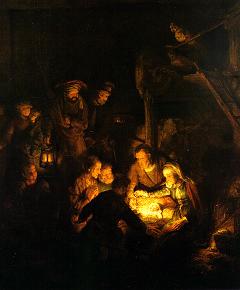
Adoration of the Shepherds
All rights reserved.
 John Seleden’s
John Seleden’s